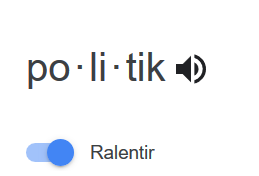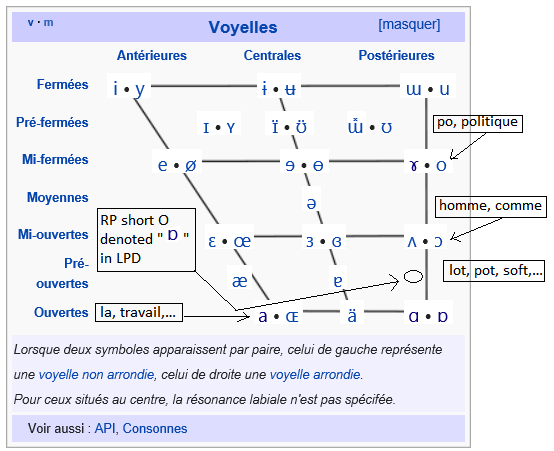Here is a transcription which, I think, corresponds to the real pronunciation. Try it at high and low speeds.

As user Laurent S. says, the pronunciations heard in the two samples proposed in the body of the question do not vary appreciably from one another; it is the pronunciation that seems to be invariably heard. I identify my pronunciation of this o as essentially the same.
You say you tend to prefer the o of the English "politics", which I suppose must be the RP short o of words like the following.
The vowel used in French is not that one, nor that of a in "la", which is one of the so called cardinal vowels; you find it at the left bottom corner in the chart below.

Table from the Free Encyclopedia: Voyelles cardinales (with added notes)
This is the pronunciation for the following words in French.
- année [ane][ané], travail [tʁavaj][travaj], moi [mwa][mwa]
Instead of these two vowels, the vowel we hear in the proposed samples is again a cardinal vowel, but a half-closed back rounded vowel (pronounced in the back of the mouth, the tongue being two thirds of the way up) (https://fr.wikipedia.org/wiki/Voyelle_mi-ferm%C3%A9e_post%C3%A9rieure_arrondie). It is found on the right of the third level from the bottom in the chart (shown above). This is the vowel you can hear in "aucune".
However, if we look up the TLFi's pronunciation we find the transcription "[pɔlitik]"; the same result is obtained from the Wiktionary.
Therefore the phonetic vowel now used is the one you find in "homme" ([ɔm][òm]) and "comme" ([kɔm][kòm]). If you listen to the pronunciations collected in the Wiktionary (homme), which I find correct, you are bound to notice a difference from the pronunciation collected by the same source for "politique". This shows that the symbol "ɔ" does not correspond to the sound in "politique", at least that which seems to prevail. An allophonic variant slightly more open and tending therefore towards [ɔ] might be used, but it can't be as open as to become "ɔ".
Nevertheless, this type of extreme variation is possible in other words. For instance "pôle", "rose" (and other such words) have the standard pronunciation [po(:)l],[ro(:)z] respectively, but in the South of the country some people might still pronounce [pɔl] and [rɔz]. compare the first two pronunciations here, as they are characteristic of the great difference there can exist in the pronunciation of a given word.


